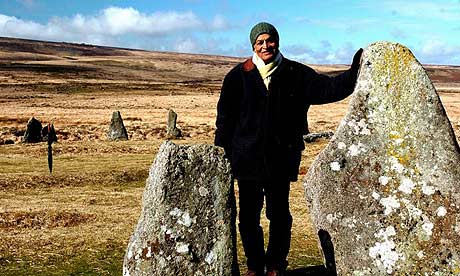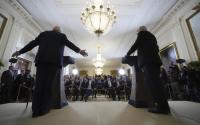16 January 2008The Guardian
 A still from the Natural World documentary, Earth Pilgrim, in which Satish Kumar walks in Dartmoor in all its seasons. Photograph: Andrew Graham-Brown/AGB Films
A still from the Natural World documentary, Earth Pilgrim, in which Satish Kumar walks in Dartmoor in all its seasons. Photograph: Andrew Graham-Brown/AGB FilmsIt sounds like a tale from a more innocent and idealistic age. Forty-six years ago, when he was 19, Satish Kumar was sitting in a southern Indian cafe with a friend when they heard that 90-year-old English philosopher Bertrand Russell was going to prison as a protest against the spread of nuclear weapons. As Kumar tells it, the two companions were so impressed by Russell's commitment to non-violence and civil disobedience, and so appalled at the potential destructive power of the weapons, that they "talked and talked" about what they could do.
In the end, Kumar, who had been trained, as a wandering Jain monk, to revere nature, but who had run away from the monastery to become a disciple of Vinoba Bhave, Gandhi's spiritual successor, vowed with his companion to set off on a peace walk to the four corners of the nuclear world - Washington, London, Paris and Moscow - as an act of protest and non-violence.
Thirty months and 8,000 miles later, carrying no passport or money and having no idea what would happen when he finished, Kumar ended up at John F Kennedy's grave in the US. The pilgrimage was over and, on one level, there was nothing to show for their effort. The world had more nuclear weapons than ever, and Kumar and his companion had worn out dozens of pairs of shoes.
But while for many people the idea of walking around the world carrying a simple message was an irrational, illogical and wholly unrealistic exercise, it has proved to have had great influence in Britain, where Kumar then settled. He has now spent 35 years in Devon teaching many of the world's leading thinkers about the necessity for ecological and spiritual values, as well as editing the magazine Resurgence. His insistence that reverence for nature needs to be at the heart of the world's political and social debate is the counterpoint to the insistent mantra of economic "realism" advocated and practised by government, environment groups and authorities.
Kumar has no time for realists. "Is my approach unrealistic?" he asks. "Look at what realists have done for us. They have led us to war and climate change, poverty on an unimaginable scale, and wholesale ecological destruction. Half of humanity goes to bed hungry because of all the realistic leaders in the world. I tell people who call me 'unrealistic' to show me what their realism has done. Realism is an outdated, overplayed and wholly exaggerated concept."
Instead, he seeks to learn from nature, which he calls his guide and cathedral. "Nature is realistic, and I would say that man is the only being who is not," he says. "Who else goes to bed hungry? Not the snakes or the tigers or any other animal. Nature does not need 'realistic' Tescos or Monsantos to feed themselves. Our system of 'realistic' business leadership has totally failed."
Kumar argues that the spiritual aspect of the environment is what has been lost in the great debate about the way we live, and that the broad environment movement has not understood the power of concepts such as love and reverence, which are not to be confused with religion, he insists. "The environment movement here is very logical and analytical. But it is driven by doom, gloom and disaster."
People look at nature from a very utilitarian point of view and see what is good for them only, he says, and seek to manage it rather than protect it. "I want to move people to a more experiential philosophy of the natural world," he says. "That way you can protect it." He sees no reason why governments and authorities should not be driven by philosophies of reverence to nature rather than violence to it.
"Social systems can be changed," Kumar insists. "The ones we have now are not very old. The trouble is we are driven by fear and so we take panic decisions, like opting for nuclear power. At the moment, our culture is of violence - to nature, animals, people, ourselves. We are not protecting nature these days so much as managing it without knowing it. If you want to protect it, go out in it."
Kumar has never given up his wanderings. In 1986, he walked 2,000 miles around Britain; in 1997, he walked to the sacred mount Kailash in Tibet. He quotes German philosopher Friedrich Nietzsche's view that you should "never trust a thought that didn't come by walking". Kumar says: "When you walk, you are in touch with the earth, with nature, the wasps, the insects, everything. In a car or a train or a plane, you are disconnected. You walk to connect yourself."
His walk around Britain convinced him that these islands were among the most beautiful in the world, despite the damage being done. His own best loved patch is Dartmoor, between his home in north Devon and the Schumacher college in Totnes that he founded and where he is programme director. "Dartmoor is home," he says. "I have been going there for 40 years. Every year, I am surprised to find something new. You do not need to go to the Himalayas or lake Baikal. On your own doorstep are the most extraordinary places. The ordinary is the extraordinary here. When my wife asked what I would like to do for my birthday, I said I only wanted to go to Dartmoor. When I want inspiration or new thinking, I go there."
On Friday, he will be seen on the moor in all four seasons in a Natural World programme on BBC2. If the film shows slightly less of him in the summer months, it's because the camera team had him in the middle of a stream when he fell and broke his ankle. It delayed everything for six weeks. "They were very accommodating, lovely people", he says.
What has he learned in England? "That there is an enormous spiritual and scientific heritage that we are ignoring. People such as [artist] William Morris, [poet] Kathleen Raine in our own time, and others. Their heritage is that of the imagination. Economics must be put in its place, imagination should be at the forefront. We are tending to go only for the economics."
This imbalance between ecology and economy, he says, leaves people stressed and unhappy. "The happiest people I have seen in Britain, or anywhere, are those who live close to the land and people who use their hands - craftspeople. All over the world they transform the world. They effect transformation. People like [environmental sculptor] Andy Goldsworthy can take a leaf and transform it. They restore the dignity of work by hand."
Now he is seeking to sow the seeds of a new economy and politics by persuading some of the world's most radical environmental thinkers to give, and take, courses at Schumacher college. But the new times need new mantras.
"The French motto of 'liberté, egalité, fraternité' was relevant to the French revolution, but it is now outdated," he says. "There is no ecological dimension to it. And the new age 'mind, body, spirit' slogan is far too navel-gazing.
"We are looking for what I would call a new trinity, a "soil, soul, society" philosophy - soil for the environment, soul for the spiritual dimension, and society for the social justice that is essential."
· Earth Pilgrim: A Year on Dartmoor, narrated by Satish Kumar, will be shown on BBC2 at 8pm on Friday.
· Kumar is the author of Spiritual Compass, Green Books, £9.95.
· Listen to Kumar on Environment Weekly at blogs.guardian.co.uk/ethicalliving






